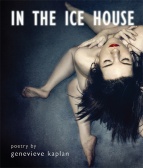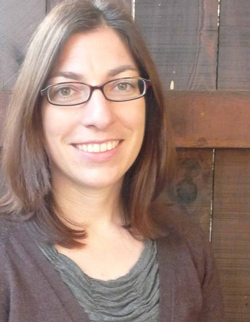
In the ice house (Red Hen Press, 2011).

In the ice house (Red Hen Press, 2011).
First Book Questionnaire: Genevieve Kaplan
1. Does your manuscript bear any relation to a graduate thesis project?
Nope. I don’t remember sending out my MFA thesis, and then I made a few attempts at books in the years between the MFA thesis and In the ice house that I sent to maybe two or three places. Once I started my PhD, though, I felt more pressure to work on a book—an unspoken pressure, of course. No one told me I had to have a book, but conversations in grad school often tended to be less about individual poems and more about “the book” or “larger project.” Without this implicit suggestion that I should be able to articulate something with more scope, I probably wouldn’t have put together In the ice house. But my book wasn’t the result of an assignment or academic project, and it was never “workshopped.” It was a very solitary project—I wrote on my own, I showed it to my husband, a couple close friends, and sent it out.
2. How do you feel about these poems now that they’ve materialized in book format?
Having my poems bound together in a book does make them feel more final. It also makes them feel more “other.” At this point I feel more able to read the poems as a reader, not just as their writer. There’s more detachment…
Also, it was a pretty long journey from the manuscript to the published book. I finished a draft of the book in 2008, won the AROHO contest at the end of 2009, and my book came out in late 2011. So by the time I saw the final product, the poems actually come together in a book with my name on it, with a cover, smelling like glue instead of toner, with a Library of Congress number, it had been a while. But it was super-exciting to get that box of books on my doorstep!
3. What was your experience when you began publishing? What challenges did you encounter?
Over the past few years I’ve felt a growing self-consciousness around publishing and poetry. Being a fairly introverted person, and preferring writing to discussing, I do struggle with self-promotion and presentation. The domination of the internet with its easy access to all sorts of poet-knowledge and poet-lore and poet-business and even poetry itself—which is admittedly pretty wonderful!—makes me really think twice (or three times or four times or a hundred times) about what I say or write and where. While I’m excited to share my work and participate in the larger community, I am simultaneously daunted—and while I recognize this is as my own special little neurosis, that doesn’t make it any less real—by the potential scope of it all. This interview, for example, I was thrilled about to begin with but have talked myself repeatedly in and out of over the last few weeks.
4. How, if at all, did chapbooks prepare you for the making of a full-length collection?
I haven’t published a chapbook of my own work (save the online chap We’ve hardly slept or At least not all at once from Gold Wake Press, which is more a long-ish poem than a chapbook), but I am borderline-obsessed with chapbooks and chapbook making and have continually experimented with bookmaking and pagination as a medium/method for composition. A tiny green chapbook I made in 2002 or 2003 of Margaret Atwood’s poem “You fit into me” (which, sadly, went mysteriously missing. To whoever swiped it from the Dey House common room: I’d still like it back!) where each page added a new line—and twist, obviously—to the poem is a chapbook that led me, in a way, to the book of In the ice house, with its series of small, continually unfolding poems.
5. How did you shape and order your manuscript?
In earlier manuscripts, I was often just trying to collect the requisite number of poems, gathering poems I’d already written and encouraging them to cohere into a book. But I was never really pleased with how those came out, so with In the ice house I wrote many of the poems with the book in mind. And I wouldn’t have ultimately written many of these poems if not for my larger sense of the project. Once I came up with the plan to use the small repeating poems as sort of touchstones for the manuscript as a whole, I was better able to begin to see my work becoming a “book,” as something more than just a haphazard collection.
6. What is your impression of book contests?
Having seen the contest route from both sides (as a poet wanting to publish and as an editor and reader for the Gold Line chapbook series, which runs an annual contest), I feel like they’re both a fairly democratic way to determine publishing and also a total crapshoot—you not only have to have a strong manuscript, but you also need luck and timing to get it to the right readers at the right moment.
I do think the contest system—on the whole—tends to promote a certain type of book, however. Like In the ice house, where there’s a cohesion to the book as a whole. To a preliminary contest reader, a book with a plan or overarching theme may stand out as feeling more complete, or more ready for publication. And that can be too bad. I also get the sense that it can be harder for a press running a contest to take a chance on a book. But less traditional books are—thankfully!—continually published. They do find a place for themselves, often outside the system. Poetry book contests are a fascinating problem, I think.
7. How did you learn to navigate the book publishing world?
Still working on that! (See #3.)
8. What aspirations did you have for this book?
Well, when I was writing it I hoped that maybe it’d be good! Having the book selected for a prize and published by a strong press reflects well on my work to potential audiences who, for example, who may not be so familiar with the field of contemporary poetry, which is nice. And even better, when people hear that I’m a poet (from my dad, for example, who tells everyone) and ask if I’ve published, it’s great to be able to say, Yes! Go buy my book!
9. How would you describe this work?
Having established that I’m already way too self-conscious about my work, I’d really rather not. I’m probably the worst person to ask to describe my book.
10. Do you work primarily on discrete poems, serially, toward a project, with a set of concerns, or otherwise?
All of the above, I think. Even though I realize that I’m frequently drawn to writing what is essentially the same poem(s), or poems that ultimately share similar concerns, I’m determined to at least try to write something new. When I finished In the ice house, I resolved not to keep writing the same way. Because In the ice house is such a narrow book, so pared down, it was obvious to me what I might change. Difficult to enact, though! I wanted to write poems with more words, to be looser with language, to lengthen the poetic utterance. So those “guidelines” drove my work for a while. I wrote a lot, became really interested in punctuation (and its lack) as a way to incorporate more language, to open up the poem rather than close it down. I really got excited about parentheses! So now I have to ban parentheses. I realize these are surface concerns, but thinking about form or language at its more basic levels helps me to explore potential content for the poem, the scope of what I might do or be able to write.
11. Whose poems affect you or your work?
I read a lot! I like canonical work, I read modernists, I might be secretly in love with Gwendolyn Brooks—I’m sort of all over the place! I think contemporary poetry is pretty exciting, and I like subscribing to presses so that books will just keep showing up on my doorstep. I just got a bunch of beautiful books from Ahsahta Press and Noemi Press (thanks, mom!) that I’m super excited to read. My friends, too—I think connecting with like-minded peers is truly the most wonderful element of graduate writing programs—continually inspire me and my work. And since they’re all publishing too, they give me plenty to read!
12. What are you working on now?
Very roughly, I’m working on writing “a western”—of the broad scope of the West, westward expansion & exploration, the unique western landscape. I’m thinking of some sprawling western poetic extravaganza, hopefully with cowboys. And rattlesnakes. I think it’s absolutely likely that I’ll fail. And I find that prospect pretty exciting, too.
---
 Genevieve Kaplan's book of poetry In the ice house won the 2009 A Room of Her Own Foundation To the Lighthouse poetry prize and was published by Red Hen Press in 2011. Her poems have recently appeared in or are forthcoming from Rhino, Yew: A Journal of Innovative Writing and Images, and Western Humanities Review. A graduate of the Iowa Writers' Workshop, she's currently working toward her PhD in Literature and Creative Writing at the University of Southern California.
Genevieve Kaplan's book of poetry In the ice house won the 2009 A Room of Her Own Foundation To the Lighthouse poetry prize and was published by Red Hen Press in 2011. Her poems have recently appeared in or are forthcoming from Rhino, Yew: A Journal of Innovative Writing and Images, and Western Humanities Review. A graduate of the Iowa Writers' Workshop, she's currently working toward her PhD in Literature and Creative Writing at the University of Southern California.